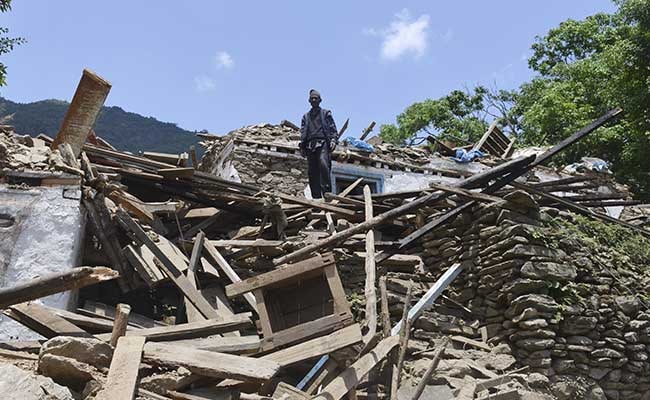
File Photo: Nepal's new Constitution deal comes weeks after an earthquake that killed thousands and devastated the country, adding to the pressure on politicians to end the long-running stalemate. (AFP)
Kathmandu:
Nepal's rival political parties have struck a historic deal on a new constitution that will divide the country into eight provinces, ending years of deadlock, a minister said today .
The deal comes weeks after an earthquake that killed thousands and devastated the country, adding to the pressure on politicians to end the long-running stalemate.
Lawmakers have missed a series of deadlines to draft a new national charter following a decade-long Maoist insurgency that left an estimated 16,000 people dead and brought down the monarchy.
Information Minister Minendra Rijal said the agreement was a "major breakthrough".
He said the disaster had "motivated us to work together", adding, "there is a will to get this done".
The deal will see the creation of eight provinces, although it leaves the crucial issue of their borders unresolved.
The opposition Maoist party wants new provinces to be created along lines that could favour historically marginalised communities, but other parties say this would be divisive and a threat to national unity.
The agreement, which was concluded around midnight on Monday, will be included in a draft charter that must be approved by a two-thirds parliamentary majority.
Maoist spokesman Dinanath Sharma said the draft constitution would be ready in July.
Under the deal, Nepal will continue with its current system of governance, which includes an executive prime minister and ceremonial president.
A federal commission will be established and get six months to draw up internal borders and submit a proposal for approval in parliament.
Newspaper editor Guna Raj Luitel said the April 25 earthquake appeared to have added impetus to the process.
"Everyone was fed up with the parties, people thought the constitution will never come because they couldn't agree on anything," said Luitel, editor-in-chief of the Nagarik daily.
"After the first quake, things changed, parties seem to have realised that they need to work together to rebuild the country," he said.
More than 8,700 people died in two quakes that hit Nepal on April 25 and May 12, destroying nearly half a million houses and leaving thousands without shelter.
The deal comes weeks after an earthquake that killed thousands and devastated the country, adding to the pressure on politicians to end the long-running stalemate.
Lawmakers have missed a series of deadlines to draft a new national charter following a decade-long Maoist insurgency that left an estimated 16,000 people dead and brought down the monarchy.
Information Minister Minendra Rijal said the agreement was a "major breakthrough".
He said the disaster had "motivated us to work together", adding, "there is a will to get this done".
The deal will see the creation of eight provinces, although it leaves the crucial issue of their borders unresolved.
The opposition Maoist party wants new provinces to be created along lines that could favour historically marginalised communities, but other parties say this would be divisive and a threat to national unity.
The agreement, which was concluded around midnight on Monday, will be included in a draft charter that must be approved by a two-thirds parliamentary majority.
Maoist spokesman Dinanath Sharma said the draft constitution would be ready in July.
Under the deal, Nepal will continue with its current system of governance, which includes an executive prime minister and ceremonial president.
A federal commission will be established and get six months to draw up internal borders and submit a proposal for approval in parliament.
Newspaper editor Guna Raj Luitel said the April 25 earthquake appeared to have added impetus to the process.
"Everyone was fed up with the parties, people thought the constitution will never come because they couldn't agree on anything," said Luitel, editor-in-chief of the Nagarik daily.
"After the first quake, things changed, parties seem to have realised that they need to work together to rebuild the country," he said.
More than 8,700 people died in two quakes that hit Nepal on April 25 and May 12, destroying nearly half a million houses and leaving thousands without shelter.
Track Latest News Live on NDTV.com and get news updates from India and around the world

